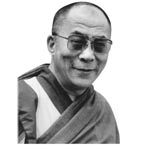EU urges China back to the negotiating table with Dalai Lama
 Beijing - The EU's top diplomat called Monday on the Chinese government to resume talks with the Tibetan government-in-exile while welcoming a memorandum from Tibetan exiles on their vision of autonomy.
Beijing - The EU's top diplomat called Monday on the Chinese government to resume talks with the Tibetan government-in-exile while welcoming a memorandum from Tibetan exiles on their vision of autonomy.
"For a long time, the Chinese wanted to see a written position," EU External Relations Commissioner Benita Ferrero-Waldner said of the Tibetan proposal made during the latest round of talks in November.
"Most important is that now there is clarity that the Chinese sovereignty and territorial integrity is not jeopardized," she told journalists after talks with Chinese officials in Beijing.
However, Ferrero-Waldner acknowledged that the differences between Beijing and the representatives of the Dalai Lama, Tibetan Buddhism's spiritual leader as well as head of the government-in-exile, had not narrowed.
Ferrero-Waldner called on China to grasp the chance posed by the talks because the Dalai Lama was an advocate for peace as well as the "middle way," in which he advocates patient negotiations with China for autonomy rather than full independence for Tibet.
China, however, accuses the Dalai Lama of being a separatist who wants to create an independent "greater Tibet" to include areas of China populated by the Tibetan ethnic minority outside the Tibet Autonomous Region. Beijing also said he wants to drive out all Han Chinese as well as the Chinese army from these areas.
The accusation stems from a call in the Tibetan memorandum to establish a government for the 5 million Tibetans within the historic Tibetan borders, which include provinces adjacent to Tibet.
This proposed administration would oversee not only religion, culture, education and the economy but also be responsible for security and law and order.
When a new round of talks might take place is not known. The Chinese government said recently that it wanted to discuss only the personal future of the Dalai Lama and not Tibetan demands for autonomy in the dialogue that began in 2002. (dpa)